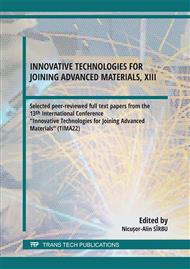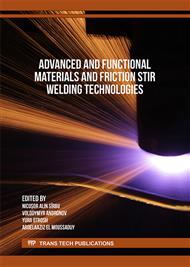[1]
Chen G., Ma Q., Zhang S., Wu J., Zhang G., Shi Q., Computational fluid dynamics simulation of friction stir welding: A comparative study on different frictional boundary conditions, Journal of Materials Science & Technology, Vol. 34, Issue 1 (2018), pp.128-134.
DOI: 10.1016/j.jmst.2017.10.015
Google Scholar
[2]
Iordache M., C. Badulescu, E. Nitu, D. Iacomi. Numerical Simulation of Friction Stir Welding (FSW) Based on ABAQUS Environment. Solid State Phenomena Vol. 254 (2016), pp.272-277.
DOI: 10.4028/www.scientific.net/ssp.254.272
Google Scholar
[3]
Bussetta P., N. Dialami, R. Boman, M. Chiumenti, C. Agelet de Saracibar, M. Cervera, J. Ponthot. Comaprison of a Fluid and a Solid Approach for the Numerical Simulation of Friction Stir Welding with a Non-Cylindrical Pin. Steel research int. 85, No. 6 (2014), pp.968-979.
DOI: 10.1002/srin.201300182
Google Scholar
[4]
Constantin A., Boşneag A., Iordache M., Bădulescu C., Niţu E., Numerical Simulation of Friction Stir Spot Welding, Applied Mechanics and Materials, Vol. 834 (2016), pp.43-48.
DOI: 10.4028/www.scientific.net/amm.834.43
Google Scholar
[5]
Boșneag A., M. Constantin E. Nițu. Numerical simulation of Friction Stir Wleding of three dissimilar aluminium alloys. Materials Science and Engineering 564 (2019), pp.1-9.
DOI: 10.1088/1757-899x/564/1/012033
Google Scholar
[6]
Pan W., D. Li, A. Tartakovsky, S. Ahzi, M. Khraisheh, M. Khaleel. A new smoothed particle hydrodynamics non-Newtonian model for friction stir welding: Process modeling and simulation of microstructure evolution in a magnesium alloy. International Journal of Plasticity (2013).
DOI: 10.1016/j.ijplas.2013.02.013
Google Scholar
[7]
Fagan T., Lemiale V., Nairn J., Ahuja Y., Ibrahim R., Estrin Y., Detailed thermal and material flow analysis of Friction Stir Welding using a three-dimensional particle based model, Journal of Materials Processing Technology, Vol. 231 (2016), pp.422-430.
DOI: 10.1016/j.jmatprotec.2016.01.009
Google Scholar
[8]
Esmaily M., A. Shokuhfar. Numerical simulation of heat transfer in friction stir welding of 7075-T6 aluminum alloy and high carbon steel using Arbitrary Lagrangian Eulerian technique. Mat.-wiss. u. Werkstofftech, 41, No. 5 (2010), pp.350-355.
DOI: 10.1002/mawe.201000608
Google Scholar
[9]
Meyghani B., M. Awang, S. Emamian, M. Nor, S. Pedapati. A Comparison of Different Finite Element Methods in the Thermal Analysis of Friction Stir Welding (FSW). Metals, 7 (2017), p.450.
DOI: 10.3390/met7100450
Google Scholar
[10]
Pashazadeh H., J. Teimournezhad, A. Masoumi. Numerical investigation on the mechanical, thermal, metallurgical and material flow characteristics in friction stir welding of copper sheets with experimental verification. Materials and Design 55 (2014), pp.619-632.
DOI: 10.1016/j.matdes.2013.09.028
Google Scholar
[11]
Mohan R., N. Rajesh, S. Kumar. Finite Element Modeling for Maximum Temperature in Friction Stir Welding of AA 1100 and Optimization of Process Parameter by Taguchi Method. IJRET, Vol. 02, Issue 05 (2014), pp.728-733.
DOI: 10.15623/ijret.2014.0305135
Google Scholar
[12]
Nimankar S., S. Dahake. FEA Analysis of Frictional Heating Process (Friction Heat vs. Linear Velocity. IJESMR 3(12), (2016).
Google Scholar
[13]
Schmidt H., J. Hattel. A local model for the thermomechanical conditions in friction stir welding. Modeling Simul. Mater. Sci. Eng. 13 (2005), pp.77-93.
DOI: 10.1088/0965-0393/13/1/006
Google Scholar
[14]
Turkan M., O. Karakas. Two different finite element models investigation of the plunge stage in joining AZ31B magnesium alloy with friction stir welding. SN Applied Sciences 3:165 (2021.
DOI: 10.1007/s42452-021-04191-6
Google Scholar
[15]
Bakroon M., R. Daryaei, D. Aubram, F. Rackwitz. Multi-Material Arbitrary Lagrangian-Eulerian and Coupled Eulerian-Lagrangian methods for large deformation geotechnical problems. NUMGE, (2018), p.673–681.
DOI: 10.1201/9781351003629-84
Google Scholar
[16]
Veljić D., M. Perović, A. Sedmak, M. Rakin, N. Bajić, B. Madjo, H. Dascau. Numerical Simulation of the Plunge Stage in Friction Stir Welding. Structural Integrity and Life, Vol. 11, No. 2 (2011), pp.131-134.
Google Scholar
[17]
Česnavičius R., S. Kilikevičius, P. Krasauskas, R. Dundulis, H. Olišauskas. Research of the friction stir welding process of aluminium alloys. Mechanika, Vol. 22(4) (2016), pp.291-296.
DOI: 10.5755/j01.mech.22.4.16167
Google Scholar
[18]
Ma N., A. Kunigi, T. Hirashima, K. Okubo, M. Kamioka. FEM simulation for friction spot joining process. Welding International Vol. 23, No 1 (2009), pp.9-14.
DOI: 10.1080/09507110802348892
Google Scholar
[19]
Sato Y., H. Takauchi, S. Park, H. Kokawa. Characteristics of the kissing-bond in friction stir welded Al alloy 1050. Materials Science and Engineering A 405 (2005), pp.333-338.
DOI: 10.1016/j.msea.2005.06.008
Google Scholar
[20]
Chauhan P., R. Jain, S. Pal, S. Singh. Modeling of defects in friction stir welding using coupled Eulerian and Lagrangian method. Journal of Manufacturing Processes 34 (2018), pp.158-166.
DOI: 10.1016/j.jmapro.2018.05.022
Google Scholar
[21]
Crăcănel M., E. Niţu, D. Iordache. Friction Stir Welding of Steel Structures – A Brief Review. Key Engineering Materials, Vol. 890 (2021), pp.105-119.
DOI: 10.4028/www.scientific.net/kem.890.105
Google Scholar
[22]
Dialami N., M. Chiumenti, M. Cervera, C. Agelet de Saracibar. An apropos kinematic framework for the numerical modeling of friction stir welding. Computers and Structures, 117 (2013), pp.48-57.
DOI: 10.1016/j.compstruc.2012.12.006
Google Scholar
[23]
Jalili N., H. Tabrizi, I. Sattarifar. Effect of Simultaneous Cooling on Temperature Field in Friction Stir Welding Process of Aluminium Ally. Proceedings of Iran International Aluminum Conference, (2014).
Google Scholar
[24]
Al-Badour F., N. Merah, A. Shuaid, A. Bazoune. Experimental and Finite Element Modeling of Friction Stir Seal Welding of Tube-Tubesheet Joint. Advanced Materials Research, Vol. 445 (2012), pp.771-776.
DOI: 10.4028/www.scientific.net/amr.445.771
Google Scholar
[25]
Schmidt H., J. Hattel. Thermal modelling of friction stir welding. Scripta Materialia 58 (2008), pp.332-337.
DOI: 10.1016/j.scriptamat.2007.10.008
Google Scholar
[26]
Khosa S., T. Weinberger, N. Enzinger. Thermo-mechanical investigations during friction stir spot welding (FSSW) of AA6082-T6. Welding of the World, Vol. 54 (2010), R134-R145.
DOI: 10.1007/bf03263499
Google Scholar
[27]
Baruah A., J. Murugesan, H. Borkar. Numerically modelled study of the plunge stage in friction stir spot welding using multi-tiered mesh partitions. Engineering Research Express 3 (2021), 045015.
DOI: 10.1088/2631-8695/ac352e
Google Scholar
[28]
Kumar K., M. Sivasangari, V. Raj, L. Raj. Numerical Simulation of Friction Stir Butt Welding Processes for AZ91 Magnesium Alloy. IJRET, Vol. 03, Issue 03 (2014), pp.101-109.
DOI: 10.15623/ijret.2014.0303018
Google Scholar
[29]
Dialami N., Chiumenti M., Cervera M., Segatori A., Osikowicz W., Enhanced friction model for Friction Stir Welding (FSW) analysis: Simulation and experimental validation, International Journal of Mechanical Sciences, Volume 133 (2017), pp.555-567.
DOI: 10.1016/j.ijmecsci.2017.09.022
Google Scholar
[30]
Buffa G., J. Hua, R. Shivpuri, L. Fratini. A continuum based fem model for friction stir welding – model development. Materials Science and Engineering A 419 (2006), pp.389-396.
DOI: 10.1016/j.msea.2005.09.040
Google Scholar
[31]
Berry G., J. Barber. The Division of Frictional Heat – A Guide to the Nature of Sliding Contact. Journal of Tribology, Vol 106 (1984), pp.405-415.
DOI: 10.1115/1.3260948
Google Scholar
[32]
Abdel-Aal H. Division of frictional heat: The dependence on sliding parameters. Int. Comm. Heat Mass Transfer, Vol. 26, No. 2, (1999) pp.279-288.
DOI: 10.1016/s0735-1933(99)00014-7
Google Scholar
[33]
Masaki K., Y. Sato, M. Meada, H. Kokawa. Experimental simulation of recrystallized microstructure in friction stir welding Al alloy using a plane-strain compression test. Scripta Materialia 58, (2008) pp.355-360.
DOI: 10.1016/j.scriptamat.2007.09.056
Google Scholar
[34]
Santos J., Staron P., Fischer T., Robson J., Kostka A., Colegrove P., Wang H., Hilgert J., Begrmann L., Hütsch L., Huber N., Schreyer A., Understanding Precipitate Evolution During Friction Stir Welding of Al-Zn-Mg-Cu Alloy Through In-situ Measurement Coupled With Simulation, Acta Materialia, Vol. 148 (2018), pp.163-172.
DOI: 10.1016/j.actamat.2018.01.020
Google Scholar
[35]
Agelet de Saracibar C., M. Chiumenti, M. Cervera, N. Dialami, A. Seret. Computational Modeling and Sub-Grid Scale Stabilizationof Incompressibility and Convection in the Numerical Simulation of Friction Stir Welding Processes. Arch Computar Methods Eng 21:3-37 (2014).
DOI: 10.1007/s11831-014-9094-z
Google Scholar
[36]
Mandal S., J. Rice, A. Elmustafa. Experimental and numerical investigation of the plunge stage in friction stir welding. Journal of Material Processing Technology 203 (2008), pp.411-419.
DOI: 10.1016/j.jmatprotec.2007.10.067
Google Scholar
[37]
Johnson G., Cook W., A Constitutive Model and Data for Metals Subjected to Large Strains, High Strain Rates and High Temperatures, International Symposium On Ballistics 7 (1983), pp.1-7.
Google Scholar
[38]
Belytschko T., Kennedy J., Schoeberle S., Quasi-Eulerian finite element formulation for fluid-structure interaction, Proceedings of Joint ASME/CSME Pressure Vessels and Piping Conference. ASME: New York, p.13, ASME (1978), 78-PVP-60.
DOI: 10.1115/1.3263303
Google Scholar
[39]
ABAQUS, Analysis User's Manual. ver. 6.14, Dassault Systemes Simulia Corp., Providence, RI, USA.
Google Scholar
[40]
Guo Z., R. Turner, A. Da Silva, N. Sauders, F. Schroeder, P. Cetlin, J. Schillé. Introduction of Materials Modelling into Processing Simulation. Matrials Science Forum, Vol. 762 (2013), pp.266-276.
DOI: 10.4028/www.scientific.net/msf.762.266
Google Scholar
[41]
Eide H., E. Meldy. Blast Loaded Aluminium Plates. Experiments and Numerical Simulations. Norwegian University of Science and Technology (2013).
Google Scholar
[42]
Ferdinandov N., D. Gospodinov. Tools for Friction Stir Welding: Review. Proceeding of University of Ruse, 60 (2021), pp.15-21.
Google Scholar



